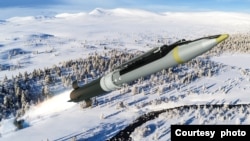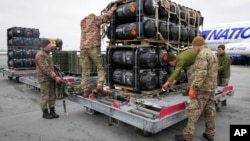The United States on Wednesday blacklisted more business officials linked to Russia’s war on Ukraine, targeting an arms dealer, his son and a group of proxy companies across Asia, Europe and the Middle East for trying to help Moscow obtain more weapons for its nearly yearlong fight.
The U.S. Department of the Treasury unveiled sanctions against Russian arms dealer Igor Zimenkov, his son Jonatan and companies connected to "the Zimenkov network" in Singapore, Cyprus, Bulgaria and Israel, among other countries.
"Russia's desperate attempts to utilize proxies to circumvent U.S. sanctions demonstrate that sanctions have made it much harder and costlier for Russia's military-industrial complex to resupply Putin's war machine," Deputy Treasury Secretary Wally Adeyemo said, referring to Russian President Vladimir Putin.
The Treasury named 22 people and organizations it said were linked to the sanctions evasion network supporting Russia's military-industrial complex. Over the last year, Treasury said it had sanctioned more than 100 people and entities engaging in activities to circumvent international sanctions and export controls imposed on Russia.
The blacklisting blocks any U.S. accounts they may own and prohibits them from doing business in the United States and with Americans.
"Targeting proxies is one of many steps that Treasury and our coalition of partners have taken, and continue to take, to tighten sanctions enforcement against Russia's defense sector, its benefactors, and its supporters," Adeyemo said.
More arms mean more tension, says Russia
Meanwhile, Russia said Wednesday that supplies of long-range weapons to Ukraine would not deter Russian forces, but would increase tensions and escalate the conflict.
The comments from Kremlin spokesman Dmitry Peskov came amid reports the United States is preparing a new round of aid that would include longer-range rockets to help Ukrainian forces fight off a Russian invasion.
Reuters reported that, according to two U.S. officials briefed on the matter, a weapon called the Ground Launched Small Diameter Bomb with a range of 150 kilometers was part of the package expected to be announced as soon as this week.
Also expected to be included were Javelin anti-tank weapons, counter-drone and counter-artillery systems, armored vehicles, communications equipment, and enough medical equipment to support three field hospitals.
Mykhailo Podolyak, an adviser to Ukrainian President Volodymyr Zelenskyy, tweeted Wednesday that each stage of war requires certain weapons. He said there is already a coalition of partners helping Ukraine obtain and train to use tanks, and that there are “talks on longer-range missiles and attack aircraft supply.”
Ukraine’s Defense Minister Oleskii Reznikov said Wednesday, a day after meeting with French officials, that he was grateful to France for providing howitzers, air defense missiles and armored vehicles, as well as fuel, equipment and training for Ukrainian soldiers.
Ukraine won a boost last week when the United States and Germany both promised to send tanks to Ukraine, after Germany hesitated for weeks over sending its advanced Leopard 2 tanks.
Ukrainian Foreign Minister Dmytro Kuleba estimated Tuesday that a dozen countries have now promised more than 100 tanks, which he described as the “first wave of contributions.”
Ukrainian officials have called on their Western allies to send fighter jets in order to better respond to the Russian attack, but so far, those calls have been met with wariness.
Some information for this report came from The Associated Press, Reuters and Agence France-Presse.






